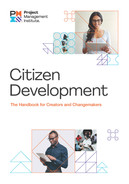Power to the People
We are in the age of disruption and transformation. Every sector and industry is being disrupted by the digital revolution. Almost US$1 trillion of economic value (Alturi, Sanhi, & Rao, 2018) is either being created or destroyed as organizations struggle to meet customer needs and remain competitive in a world dominated by digital applications and data.
Advances in artificial intelligence (AI) are rapidly disconnecting end users from the complexity of the technology they use. The result is a world where we can do many things without having to understand how it all works. A good example is Apple's intelligent assistant, Siri, which allows any user to ask complicated questions using natural language input and receive answers immediately, all without having to spend time on complex research. In the world of application development, a similar revolution is emerging. Software engines are now sophisticated enough to write code from a few visual diagrams put together by a business user. Traditionally, called “no code” or “low code,” these new software applications are becoming more and more practical, creating a US$20 billion market (Rymer, Mines, Hammond, Vizgaitis, & Reese, 2017) as organizations try to leverage this new technology to gain a competitive advantage. This new capability, “citizen development,” democratizes the skills required to develop applications such that every citizen can do it. This term has found new life in other industries experiencing similar developments, including citizen data scientists, citizen doctors, and so on.
| DID YOU KNOW? |
Back in 2012, Gartner analysts declared, “We're all developers now”—a reference to the nascent citizen developer movement (Ramel, 2015).
We call the enabling technology for enterprise applications citizen development application platforms (CDAPs). These platforms are intuitive and quick to use and give citizen developers the tools they need to be creative and solve problems. One of the key benefits is the sophistication of an AI engine that can effectively write code given a set of specifications. Advances in AI will effectively disaggregate the technical knowledge required from the business knowledge, enabling citizen developers to create disruptive technologies without the prerequisite technical knowledge. In addition, many business leaders now recognize the value of delegating decision making to the person or team within their organization that has the knowledge and experience to make the most informed decision. Hierarchical and centralized decision making is being replaced by a new paradigm: The Project Economy. The Project Economy is one in which people have the skills and capabilities they need to turn ideas into reality. It is where organizations deliver value to stakeholders through the successful completion of projects and delivery of products.
The Project Economy will fundamentally redesign how work gets done and is creating a distinct shift away from functional specializations toward temporary project structures comprised of cross-functional teams focused on short- and medium-term goals. Citizen developers are bringing two major changes to how organizations work: capacity and speed. They provide capacity to IT teams as citizen developers can take on many of the backlog requirements that ordinarily an IT specialist or department would need to address. Secondly, citizen developers, as domain experts, have the potential to solve some of an organization's challenges quickly and effectively. The speed at which they can take an idea, then design, build, test, and deploy solutions enables organizations to bring products and services to market in unprecedented time frames.
As organizations look to leverage citizen development in their digital transformation programs, there are many pitfalls to avoid, including the lack of a comprehensive methodology and framework, and adequate training is required to allow citizen developers to succeed. Central to PMI's goal of enabling successful and sustainable change, this book was written to address the key issues organizations must understand to successfully create value when implementing citizen development.
| DEFINITION |
No code
No-code development platforms allow programmers and nonprogrammers to create application software through graphical user interfaces and configuration instead of traditional computer programming (“No-Code Development Platform,” 2020).
Low code
Low-code development platforms may call for limited amounts of coding, requiring nontechnical users to work together with developers during some or all of the development process (Tobin, 2020).
